

Life-Changing Books: Your Picks. We asked our readers what books made the biggest difference in their lives, and here’s what they had to say.
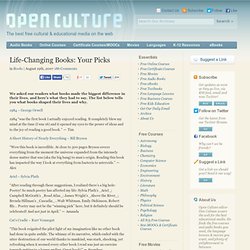
The list below tells you what books shaped their lives and why. 1984 – George Orwell 1984 “was the first book I actually enjoyed reading. It completely blew my mind at the time (I was 16) and it opened my eyes to the power of ideas and to the joy of reading a good book.” — Tim A Short History of Nearly Everything – Bill Bryson “Wow this book is incredible.
Ariel – Sylvia Plath “After reading through these suggestions, I realized there’s a big hole: Poetry! Cat’s Cradle – Kurt Vonnegut “This book reignited the pilot light of my imagination like no other book had done in quite awhile. Crooked Cucumber – The Life and Zen Teaching of Shunryu Suzuki “Although I am not practicing Zen (yet), this book is like my Bible in that I plan to always read over it and reflect upon the messages therein. Disturbing the Peace – Vaclav Havel Extremely Loud and Incredibly Close – Jonathan Safran Foer. How to Find Your Purpose and Do What You Love. “Find something more important than you are,” philosopher Dan Dennett once said in discussing the secret of happiness, “and dedicate your life to it.”
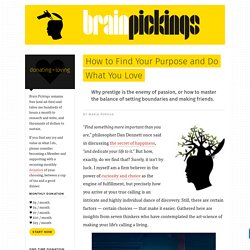
But how, exactly, do we find that? Surely, it isn’t by luck. I myself am a firm believer in the power of curiosity and choice as the engine of fulfillment, but precisely how you arrive at your true calling is an intricate and highly individual dance of discovery. Still, there are certain factors — certain choices — that make it easier. Gathered here are insights from seven thinkers who have contemplated the art-science of making your life’s calling a living.
Every few months, I rediscover and redevour Y-Combinator founder Paul Graham’s fantastic 2006 article, How to Do What You Love. What you should not do, I think, is worry about the opinion of anyone beyond your friends. More of Graham’s wisdom on how to find meaning and make wealth can be found in Hackers & Painters: Big Ideas from the Computer Age. 16. 28. What is Philosophy? An Omnibus of Definitions from Prominent Philosophers. By Maria Popova “Philosophy is 99 per cent about critical reflection on anything you care to be interested in.” Last week, we explored how some of history’s greatest minds, including Richard Feynman, Carl Sagan, Albert Einstein, Marie Curie, and Isaac Asimov, defined science. Kant famously considered philosophy the “queen of the sciences” — whether or not that is true, philosophy seems even more elusive than science to define.
From Philosophy Bites, the book based on the wonderful podcast of the same name, comes an omnibus of definitions, bound by a most fascinating disclaimer — for, as Nigel Warburton keenly observes in the book’s introduction, “philosophy is an unusual subject in that its practitioners don’t agree what it’s about.” The following definitions are excerpted from the first chapter of the book, which asks a number of prominent contemporary philosophers the seemingly simple yet, as we’ll see, awfully messy question, “What is philosophy?” John Cleese on how to be more creative, Einstein's advice to a little girl who wanted to be a scientist, how to listen to music, and more. Hey <<Name>>!
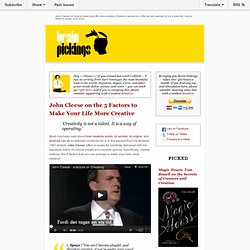
If you missed last week's edition – 8 tips on writing from Kurt Vonnegut, the most beautiful book in the world, Feynman, Sagan, Curie, and other great minds define science, and more – you can catch up right here. And if you're enjoying this, please consider supporting with a modest donation. John Cleese on the 5 Factors to Make Your Life More Creative 'Creativity is not a talent.
It is a way of operating.' Focus@will. Why Weird Experiences Boost Creativity. Creative people think differently.
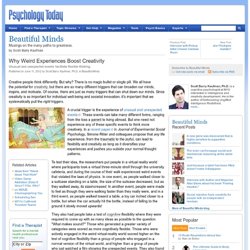
But why? There is no magic bullet or single pill. 10 Insights to Enhance the Joy of Learning. Over at The Creativity Post , Annie Murphy Paul has an excellent piece called " Where's the Joy in Learning?
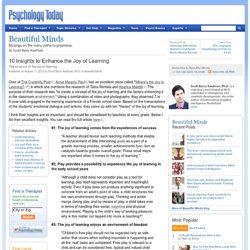
", in which she mentions the research of Taina Rantala and Kaarina Määttä . The purpose of their research was "to create a concept of the joy of learning and the factors enhancing it in the classroom environment . " Using a combination of video and photography, they observed 7 to 8-year-olds engaged in the learning experience of a Finnish school class. The Creativity Post.
Literature and Latte - Links for Writers. Why have a separate section for “word processing software”?
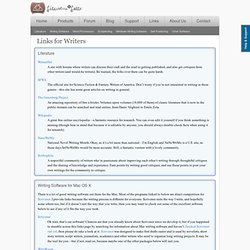
Why not just put it all under “writing software”? Word processing software is writing software by definition, of couse, and much of the software in the “writing software” section above might equally be categorised as word processors. Just For Laugh- Top 10 funny pranks. Best Of Just For Laughs Gags - Science Fiction Galore. Best of Just For Laughs Gags - Defying Gravity Insane Pranks.
Best of Just For Laughs Gags - Top Romeos Picking Up Women Pranks. Best of Just For Laughs Gags - Most Crazy Complex Pranks. Examined life - cornel west. Make Your Own Handwriting Fonts For Free. By AN Jay on February 12, 2009 Make Your Own Handwriting Fonts For Free Don't Forget to participate in a contest where you can win an amazing e-Commerce template from TemplateMonster.
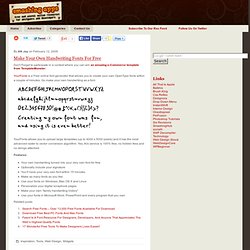
YourFonts is a Free online font generator that allows you to create your own OpenType fonts within a couple of minutes. The Future is Ours. Una Furtiva Lagrima. MOVE. One With Nature Inspirational Video - Marisa Russo. Nature in Time-Lapse: 10 Awe-Inspiring Videos. Time-lapse photography uncovers an unseen world, showing us scenes we'd never be able to perceive in real time. We've shown you great design-related time-lapse videos before, but this time we go back to nature.
These 10 terrific time-lapse creations from the wonderful world of nature will amaze and inspire you. From the lifecycle of a simple weed to the majestic splendour of the Northern Lights, we think you'll find something awe-inspiring in our collection. Yanni World Dance. Nature, A Fireworks Spectacular [HD Original] The Secret - Planet Earth HD. Music and Life - Alan Watts. Where the Hell is Matt? 2012.
Where the Hell is Matt? 2006. Organization & Productivity. Book Review: Practical Ways to Become More Creative - In Innovation Generation, Roberta Ness presents a blueprint for scientists and others who are striving to be more creative.
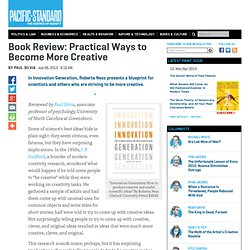
“Innovation Generation: How to produce creative and useful scientific ideas” By Roberta Ness (Oxford University Press) $29.95 Reviewed by Paul Silvia, associate professor of psychology, University of North Carolina at Greensboro. Some of science’s best ideas hide in plain sight: they seem obvious, even fatuous, but they have surprising implications. In the 1950s, J. Creativity Blocked? Try a Common Scents Solution - New research suggests specially selected nocturnal odors can inspire creativity.
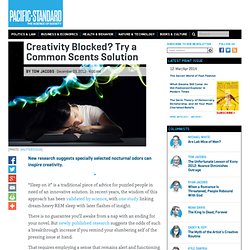
“Sleep on it” is a traditional piece of advice for puzzled people in need of an innovative solution. In recent years, the wisdom of this approach has been validated by science, with one study linking dream-heavy REM sleep with later flashes of insight. There is no guarantee you’ll awake from a nap with an ending for your novel. Creativity. Creativity Where does creativity come from?
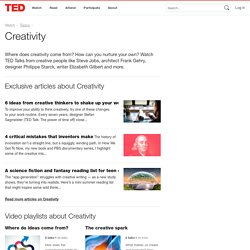
How can you nurture your own? Watch TED Talks from creative people like Steve Jobs, architect Frank Gehry, designer Philippe Starck, writer Elizabeth Gilbert and more. @import url(" Creativity. Assessment | Biopsychology | Comparative | Cognitive | Developmental | Language | Individual differences | Personality | Philosophy | Social |Methods | Statistics | Clinical | Educational | Industrial | Professional items | World psychology | Personality:Self concept · Personality testing · Theories · Mind-body problem This article is in need of attention from a psychologist/academic expert on the subject.Please help recruit one, or improve this page yourself if you are qualified.This banner appears on articles that are weak and whose contents should be approached with academic caution Main article: The psychology of creativity Main article: The teaching of creativity.
Creativity techniques. Assessment | Biopsychology | Comparative | Cognitive | Developmental | Language | Individual differences | Personality | Philosophy | Social |Methods | Statistics | Clinical | Educational | Industrial | Professional items | World psychology | Cognitive Psychology:Attention · Decision making · Learning · Judgement · Memory · Motivation · Perception · Reasoning · Thinking - Cognitive processesCognition - OutlineIndex Creativity techniques are heuristic methods to facilitate creativity in a person or a group of people.
Generally, most creativity techniques use associations between the goal (or the problem), the current state (which may be an imperfect solution to the problem), and some stimulus (possibly selected randomly). There is an analogy between many creativity techniques and methods of evolutionary computation. Kickstarter. 29 Ways To Stay Creative. The 6 Myths Of Creativity. Creativity. These days, there's hardly a mission statement that doesn't herald it, or a CEO who doesn't laud it. And yet despite all of the attention that business creativity has won over the past few years, maddeningly little is known about day-to-day innovation in the workplace. Where do breakthrough ideas come from? What kind of work environment allows them to flourish?
7 must-read books on education, a rare look at Antarctica from 1911 and more. Five Manifestos for the Creative Life. Creativity. Creativity for Life. Creativity For Life! - Helping You Live More Creatively Every Day,,, How to Harness Your Creativity at Work. Www.creativityatwork.com. The Science of Creativity in 2013: Looking Back to Look Forward. In 1950, the American psychologist Joy P. Guilford delivered a lecture to the American Psychological Association (APA) calling for a scientific focus on creativity. Psychology knew little about creativity at the time. Years earlier, during WWII, the Air Force commissioned Guilford, then a psychologist at USC, to identify pilots who would respond to emergencies with original insights to save themselves and the plane.
IQ was a popular measurement but it did not capture the type of thinking that generated novel solutions to urgent predicaments. Studying pilots led Guilford to a few insights he shared with his colleagues at the APA in 1950. Unfortunately, Guilford’s ideas did not give rise to widespread research in creativity.
The 21st century is witnessing a renaissance in creativity in both the lab and the pages of popular books and magazines.